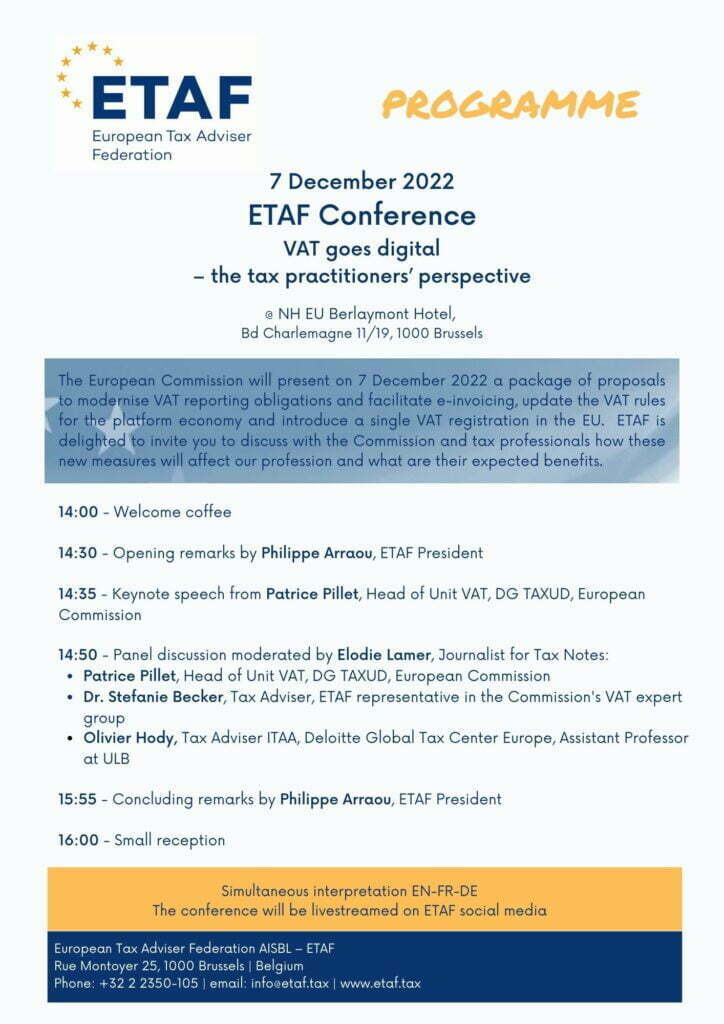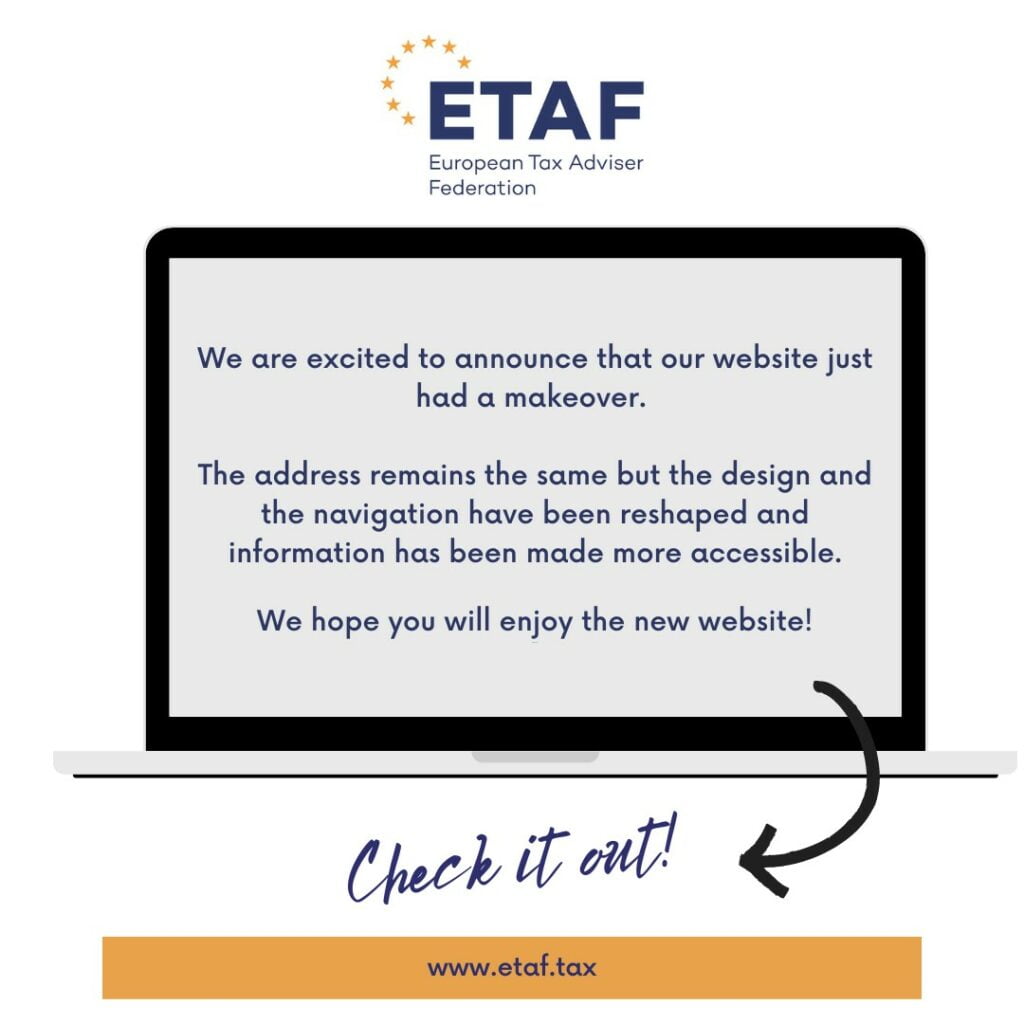EU Tax Symposium on the tax mix for the future
The European Commission held its first Tax Symposium “On the road to 2050: a tax mix for the future” on Monday 28 November in Brussels. Tax experts and EU officials discussed three main topics: the right tax mix for the future, the role of taxation in supporting sustainable growth and corporate taxation beyond the OECD Two-Pillars agreement. The importance of changing the tax structure to advance the climate transition was largely highlighted. Vitor Gaspar, Head of Fiscal Affairs at the International Monetary Fund, identified four drivers of change: - digitalisation, which is rethinking efficient and equitable taxation; - population dynamics, which will lead to taxation of consumption and capital instead of labour; - globalisation, which shows that the destination principle is more robust than the source principle; - global public goods, which will lead to the introduction of a corrective tax for climate and health. For André Sapir, Professor of Economics at the Université Libre de Bruxelles, the main issue concerns labour taxation, given its importance in the current tax mix of EU Member States. It is not only a matter of revenue but also of fairness and behavioural change, he added. Some experts, like Rita de la Feria, professor of Tax Law at the University of Leeds, argued that we don’t need to create new taxes but that we should instead modernize the existing ones, such as VAT. The Czech Minister of Finance, Zbyněk Stanjura, warned that a one size approach will not fit all and that it will be difficult to find a common tax mix that suits every Member State. The European Commission intends to organize a follow-up event next year to continue the reflection.
Uncertainties on a possible agreement on Pillar Two on 6 December
Uncertainties remain about a possible agreement on the Implementing Directive on Pillar Two (minimum taxation) during the Ecofin Council meeting on 6 December. On Thursday 1 December, EU Member States reportedly confirmed that the draft directive is technically ready but the Hungarian permanent representative to the EU told EU Finance ministers that Hungary hasn’t changed its position on Pillar Two. Observers say that Hungary is using its veto on Pillar Two to get its recovery plan approved. The positive assessment given by the European Commission on Wednesday 30 November on the Hungarian recovery plan gave hope that Hungary may lift its veto. At this stage, both Pillar Two and the Hungarian recovery plan reportedly remain on the agenda of the Ecofin Council but an extra meeting could be convened mid-December to give more time to Member States to assess the Hungarian recovery plan.
DAC8 preview
The European Commission will present on Wednesday 7 December the eighth amendment to the Directive on Administrative Cooperation in Tax Matters (DAC8) to extend the scope of the already existing automatic exchange of information to crypto-assets service providers. The text would reportedly require crypto exchanges and digital wallet providers to give tax authorities information on their customers' holdings. The European Commission would also reportedly have to establish a central register for information to be recorded and shared on crypto assets, to be made available to the competent authorities of all Member States by 2026. This text will be an important step for the taxation of crypto-assets in the EU.
DEBRA discussions put on hold in Council
The discussions in the Council of the EU on the proposal for a debt-equity bias reduction allowance have been put on hold, according to the traditional Ecofin Report to the European Council on tax issues, which is due to be adopted on 6 December. “In light of the many interlinkages with other corporate tax files, both those currently under discussion in the Council and those announced by the Commission in the near future in its Communication on business taxation for the 21st century, the examination of the DEBRA proposal will be suspended and, if appropriate, it would be reassessed within a broader context only after other proposals in the area of corporate income taxation announced by the Commission have been put forward”, we can read. The proposal was presented in May 2022 and aims at ensuring that equity receives similar tax treatment as debt.
EU Finance Ministers to discuss the way forward on energy taxation
To guide the policy debate that will be held between Finance Ministers on 6 December, the Czech Presidency of the Council of the EU issued a preparation document on the revision of the energy taxation directive. According to the document, some Member States are not yet in a position to support the Presidency text or have scrutiny reservations. In particular, further work is needed on the pace of the gradual implementation of the new rules and of the abolition of some exemptions for the aviation and maritime sectors. “Despite the intensive work carried out on the ETD file, the complexity of the file has impeded an agreement so far”, the Czech Presidency writes. The document notably asks ministers if they agree that the future work should seek to reach a compromise striking a balance between the EU minimum levels of taxation and the length of transitional periods to accommodate the Member States’ economic, geopolitical, geographical and social circumstances, in particular in relation to the most sensitive sectors.
MEPs adopt their position on the UNSHELL directive
The economic and monetary affairs committee (ECON) of the European Parliament adopted on Wednesday 30 November a non-binding opinion on the Commission’s proposal for a directive setting out criteria for determining a shell company used for tax avoidance (UNSHELL). In their opinion, MEPs amend the Commission proposal, notably by slightly lowering the thresholds below which a company is exempt of the reporting requirements of the directive. They also say that companies subject to the reporting requirements should be obliged to provide more detailed information. On penalties, MEPs say that these should amount to a minimum of 2% of an undertaking’s revenue in the relevant tax year for failure to report correctly and 4% of revenue for making false declarations. In the case of zero or revenue falling below a threshold set by the national tax authority, the penalty should be based on the undertaking’s total assets, according to the opinion. The Council of the EU is still negotiating on the text. The Council would reportedly have decided to merge the gateway and the substance test into one article, leading to one set of rules. There is reportedly no agreement on the sanctions, exclusions and tax consequences. An agreement is not expected before the Spanish Presidency in July 2023.
Last call to register to ETAF VAT Conference on 7 December
Register here: https://sweapevent.com/etafconference07_12_22


Disclaimer
This newsletter contains information about European tax policies and developments gathered from official documents, hearings, conferences and the press. It does not reflect the official position of ETAF nor should it be taken as a written statement on behalf of ETAF.
